Mural Arts Announces Grant Award from The William Penn Foundation for $425,000
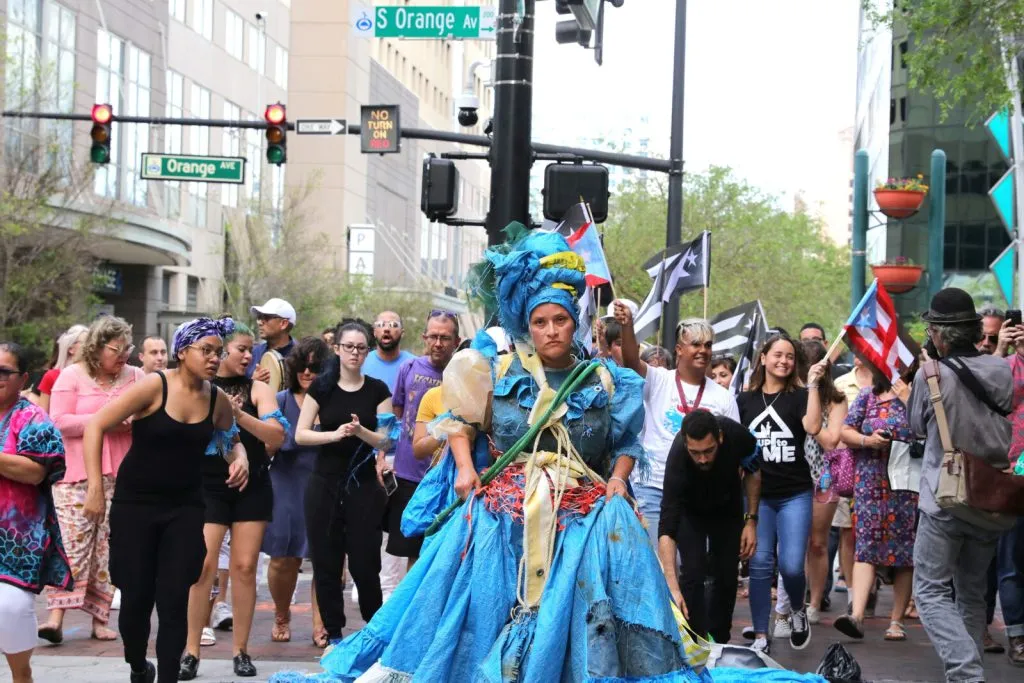
Supporting Creative place-keeping collaborations with Philadelphia’s Norris Square Neighborhood and The People’s Budget project empowering residents to engage directly in the municipal budgeting process
Mural Arts is delighted to announce that the William Penn Foundation will be supporting two creative place-keeping collaborations in Philadelphia’s Norris Square neighborhood in 2025 and 2026 to represent the rich heritage and solidarity of their community through two distinct but intersecting projects: CAICU (2024-2025) and Vamonos pa’l monte (2025-2026). In addition, the William Penn Foundation will support Mural Arts’ People’s Budget project, which empowers residents to engage directly in the municipal budgeting process.
About the Creative-Placekeeping projects in Norris Square
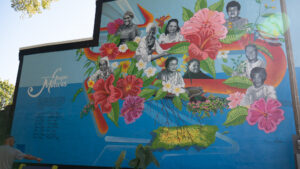
Norris Square has been home to a Puerto Rican community since the 1950s. In 1973, a group of women, Grupo Motivos, formed the Norris Square Neighborhood Project (NSNP) to support youth in a positive way. Over the next decade, NSNP and Grupo Motivos converted six lots into Puerto Rican and Latinx-themed gardens. Mural Arts collaborated on several vibrant murals as a complement to the gardens. Today, Norris Square residents face displacement resulting from real estate development. In response, community leaders in Norris Square are working to strengthen community and public awareness of the neighborhood’s history and identity.
Both CAICU and Vamonos pa’l monte are expressions of MAP’s commitment to community-driven creative processes. Across these projects, we are fostering dialogue and connection among residents around concepts of home and identity, offering an opportunity for exchange between people living in Philadelphia and Puerto Rico, sharing emerging themes through installations and performances in public space, and inviting Philadelphia residents to engage.
About CAICU

CAICU is a socially engaged public art series weaving together six culturally and historically significant Puerto Rican-themed gardens in Philadelphia’s Norris Square neighborhood. Led by Philadelphia-based curator Marángeli Mejía-Rabell and Puerto Rico-based muralist Celso Gonzalez, the project will strengthen community and public awareness of the neighborhood’s history and identity through public art and foster cultural exchange with Loíza, Puerto Rico.
Launched in spring 2024 and running through spring 2026, the project will engage residents through public art and foster a dynamic cultural exchange between people in Philadelphia and Puerto Rico who share familial and ancestral roots. This will enrich dialogue about concepts of home, identity, self-actualization, and transformation, which will influence the creation of public artwork by artist Celso Gonzalez.
As part of the cultural exchange, Gonzalez will collaborate with Dr. Marta Moreno Vega, co-founder of Loíza’s Corredor Afro, to engage Puerto Rican residents in the opportunity. He will also build a team of assistants composed of emerging artists from Loíza and Philadelphia. They will work closely with Norris Square residents to understand their neighborhood, aspirations, and visions for the gardens. He will produce a cohesive design spanning the sites, potentially integrating muralism, mosaic, sculpture, and landscape design.
“CAICU honors the space where history, legacy, and ancestral practices serve as the meeting point with emerging voices and grounding for community building and co-creation with a focus on collective impact,” says curator Marángeli Mejía-Rabell. “This project builds on this curatorial perspective and strategic framework built over years of collaboration with folks I admire and respect. Truly honored to have this opportunity.”
This dynamic project will engage the community through various methods, including teach-ins, historical research, oral history and storytelling, virtual sessions bridging Philadelphia and Loíza, and community meals and gatherings. Through thoughtful design and facilitation, these engagements will generate themes, images, memories, and narratives that will influence Celso’s approach to the project design – both how it will function and what it will communicate. Collaborators will include Termite TV Collective, Philadelphia Latino Arts & Film Festival, and AFROTAINO.
About Vamonos pa’l monte
Vámonos pa’l monte (Let’s go to the mountains), a collaborative processional performance created by multi-disciplinary artist Wanda Raimundi-Ortiz. Curated by University of Pennsylvania American Art professor Dr. Gwendolyn Dubois Shaw, the project will explore and celebrate the culturally complex identities of Puerto Ricans in the United States.
Raimundi-Ortiz will collaborate extensively with the Puerto Rican community of Philadelphia’s Norris Square over the next two years, conducting one-on-one interviews and workshops, as well as inviting them to join the culminating procession in 2026. Production Manager and Designer Kristina Tollefson will also collaborate on Vámonos pa’l monte, contributing her expertise in costume design to create a multi-sensory experience combining movement, sound design, and music. The procession will begin at City Hall, pass Independence Mall, and conclude in Norris Square.
The route and sites of the Vámonos pa’l monte project performances will be decided during Raimundi-Ortiz’s meetings with local stakeholders. Throughout the procession, Raimundi-Ortiz and participants will pause at multiple points, adding and shedding costume layers and incorporating motifs and symbols of Puerto Rico’s ecology and landscape, giving the audience various opportunities to engage with the procession.
This festive event will be performed amid the nation’s 250th-anniversary celebrations, presenting a defiant and joyous representation of the manifold ways Puerto Ricans adapt to sustain their identities while living in the United States.
The Vámonos pa’l monte procession is not just an urban street party but also a depiction of the joyful and bold Puerto Rican culture that brings life to Philadelphia. It is a celebration of Puerto Rican Americans’ identities and an acknowledgment of the hardships they and their ancestors have faced since migrating.
About the People’s Budget
“The city budget transcends numbers; it is a narrative about our city’s priorities. It is a story of afterschool programs, accessible shelters, captivating murals, trash pick-ups, neighborhood gardens, affordable transportation, and everything that goes into making Philadelphia our home. Budgets are a moral document; they are a law, a plan with a price tag, a forecast for our future. They show us what a city values, where it’s willing to invest, and, equally importantly, what it’s willing to ignore.” says artist Phoebe Bachman.
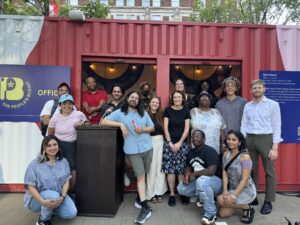 The People’s Budget Office (PBO) is a project by artist Phoebe Bachman in collaboration with Mural Arts Philadelphia that empowers residents to engage directly in the municipal budgeting process. Launched in 2021, the project is designed to educate residents about how the city budget works, provide opportunities for advocacy, and imagine what a fully funded city could look like. The project offers opportunities to gather community input on funding priorities and foster greater transparency and accountability in local government.
The People’s Budget Office (PBO) is a project by artist Phoebe Bachman in collaboration with Mural Arts Philadelphia that empowers residents to engage directly in the municipal budgeting process. Launched in 2021, the project is designed to educate residents about how the city budget works, provide opportunities for advocacy, and imagine what a fully funded city could look like. The project offers opportunities to gather community input on funding priorities and foster greater transparency and accountability in local government.
Since its inception, the People’s Budget has served residents of Philadelphia through creative projects about the city budget. It has hosted budget trainings, roundtables, and community events across Philadelphia, engaging thousands in meaningful dialogues about the city budget. These activities have not only educated participants about budget processes but also provided a platform for them to voice their priorities and concerns. These budget priorities gathered through multiple forms over the last four years have been analyzed and written as reports shared with the City’s Budget Office and City Council.
Through the support of the William Penn Foundation, we will expand the impact of the People’s Budget through deeper engagement of residents using new strategies and approaches and ensure defined pathways for accountability from City Government. These approaches speak to the essential goals of the project: education, advocacy, imagination and, ultimately, change.
Key Strategies
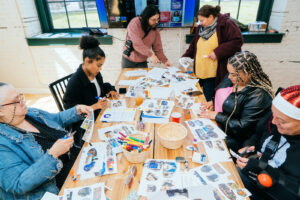
Education
Having an understanding of the city budget should be accessible to everyone, not just policymakers. The People’s Budget Office focuses on making budgeting engaging and approachable through Budget 101 trainings across Philadelphia; particularly in neighborhoods facing chronic disinvestment. These sessions break down the basics: how the budget works, who makes decisions, and when residents can get involved.
To support these efforts, PBO has developed activity booklets encouraging participants of all ages to reflect on what they see in their neighborhoods and imagine what they would like to see. In the coming year, the project plans to expand educational offerings with Budget 201 sessions, which delve deeper into municipal finance and issues like illegal dumping, library hours, and after-school programming.
PBO is also launching a comprehensive website and a multilingual public outreach campaign that includes brochures, billboards, and collaborations with local media to reach as many residents as possible.
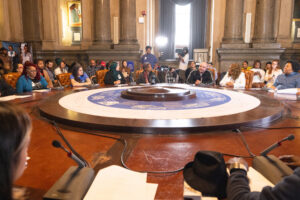
Advocacy
Philadelphia does not have a participatory budgeting system, so the People’s Budget Office encourages residents to advocate for their priorities directly to their elected officials. Since 2021, the project has collaborated with grassroots groups to amplify their demands through posters, postcards, and direct actions. With this grant, PBO aspires to create a clear pipeline to advocacy, making our movements stronger through collaboration.
Imagination
Radical imagination is at the heart of creating a more equitable city. The People’s Budget Office invites artists to interpret the budget creatively, telling stories about what is funded and imagining what a fully funded city could look like.
 A centerpiece of this effort is PBO’s artist residency program at its LOVE Park hub; a retrofitted shipping container that serves as a space for workshops, events, and a rotating mural. Artistic outcomes from this program have included a participatory quilt, a youth-led mural, a comic book, and more. The upcoming People’s Budget Roundtable will allow residents to collaboratively create a budget, fostering collective decision-making. Illustrators will then visualize the results, producing posters that show what a fully funded city might look like.
A centerpiece of this effort is PBO’s artist residency program at its LOVE Park hub; a retrofitted shipping container that serves as a space for workshops, events, and a rotating mural. Artistic outcomes from this program have included a participatory quilt, a youth-led mural, a comic book, and more. The upcoming People’s Budget Roundtable will allow residents to collaboratively create a budget, fostering collective decision-making. Illustrators will then visualize the results, producing posters that show what a fully funded city might look like.
The People’s Budget Office is committed to empowering Philadelphians to actively shape their city’s future. By fostering education, advocacy, and imagination, the project provides residents with the tools to influence budget decisions and advocate for their communities. Through collective action and accountability, PBO aims to create a more equitable and inclusive Philadelphia that reflects the needs and priorities of its people.
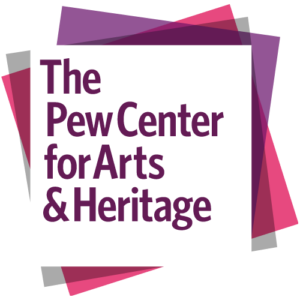 Vamonos pa’l monte has been supported by The Pew Center for Arts & Heritage.
Vamonos pa’l monte has been supported by The Pew Center for Arts & Heritage.
 CAICU is supported in part by an award from the National Endowment for the Arts.
CAICU is supported in part by an award from the National Endowment for the Arts.
About William Penn Foundation
![]()
About William Penn Foundation
The William Penn Foundation, founded in 1945 by Otto and Phoebe Haas, is committed to expanding access to resources and opportunities that promote a more vital and just city and region for all. We do this through funding programs in the Philadelphia region in arts and culture, children and families, democracy and civic initiatives, environment and public space, and workforce training and services. Learn more at www.williampennfoundation.org.
